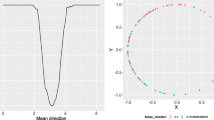Abstract
This paper provides analytical methods for characterizing the variation of the shape of neuro-anatomically significant substructures of the brain in an ensemble of brain images. The focus of this paper is on the neuro-anatomical variation of the “shape” of 2-dimensional surfaces in the brain. Brain surfaces are studied by building templates that are smooth sub-manifolds of the underlying coordinate system of the brain. Variation of the shape in populations is quantified via defining Gaussian random vector fields on these sub-manifolds. Methods for the empirical construction of Gaussian random vector fields for representing the variations of the substructures are presented. As an example, using these methods we characterize the shape of the hippocampus in a population of normal controls and schizophrenic brains. Results from a recently completed study comparing shapes of the hippocampus in a group of matched schizophrenic and normal control subjects are presented. Bayesian hypothesis test is formulated to cluster the normal and schizophrenic hippocampi in the population of 20 individuals.
This work was supported in part by the NIH grants RR01380, RO1-MH52158-01A1, ARO DAAL-03-86-K-0110, NSF grant BIR-9424264 and a grant from the Whittaker Foundation.
Preview
Unable to display preview. Download preview PDF.
Similar content being viewed by others
References
M.I. Miller, G.E. Christensen, Y. Amit, and U. Grenander. Mathematical textbook of deformable neuroanatomies. Proceedings of the National Academy of Science, 90(24), December 1993.
G. Christensen. Deformable Shape Models for Anatomy. Ph.D. Dissertation, Department of Electrical Engineering, Sever Institute of Technology, Washington University, St. Louis, MO, Aug 1994.
G. E. Christensen, R. D. Rabbitt, and M.I. Miller. 3D brain mapping using a deformable neuroanatomy. Physics in Medicine and Biology, 39:609–618, 1994.
U. Grenander and M. I. Miller. Representations of knowledge in complex systems. Journal of the Royal Statistical Society B, 56(3):549–603, 1994.
Sarang C. Joshi, Michael I. Miller, Gary E. Christensen, Ayananshu Banerjee, Thomas A. Coogan, and Ulf Grenander. Hierarchical brain mapping via a generalized dirichlet solution for mapping brain manifolds. In Proc. of the SPIE's 1995 International Symposium on Optical Science, Engineering, and Instrumentation: Vision Geometry IV, volume 2573, pages 278–289, San Diego, CA., August 1995.
G. E. Christensen, S. C. Joshi, and M. I. Miller. Volumetric transformation of brain anatomy. IEEE Transactions on Medical Imaging.
M. Claudio and S. Roberto. Using marching cubes on small machines. Graphical Models and Image Processing, 56:182–3, 1994.
Sarang C. Joshi, Jing Wang, Michael I. Miller, David Van Essen, and Ulf Grenander. On the differential geometry of the cortical surface. In Proc. of the SPIE's 1995 International Symposium on Optical Science, Engineering, and Instrumentation:Vision Geometry IV, volume 2573, pages 304–311, San Diego, CA., August 1995.
W. M. Boothby. An Introduction to Differentiable Manifolds and Riemannian Geometry. Academic Press, 1986.
T.F. Cootes, C.J. Taylor, D.H. Cooper, and J. Graham. Active shape models—their training and application. Computer Vision and Image Understanding, 61(1):38–59, 1995.
Alan Yuille and Peter Hallinan. Active Vision, chapter Deformable Templates. MIT Press, Cambridge, MA, 1992.
Paul D. Sampson, Fred L. Bookstein, Florence H. Sheehan, and Edward L Bolson. Eigen Shape Analysis of Left Ventricular Outlines From Contrast Ventriculograms, pages 211–233. Plenum Press, New York, 1996.
G. H. Golub and C. F. Van Loan. Matrix Computations. The Johns Hopkins Univ. Press, Baltimore, 1983.
John W. Haller, Gary E. Christensen, Sarang Joshi, John W. Newcomer, Michael I. Miller, John C. Csernansky, and Michael W. Vannier. Hippocampal mr imaging morphometry by means of general pattern matching. Radiology, 199(3):787–791, June 1996.
John W. Haller, A. Banerjee, Gary E. Christensen, Sarang Joshi, Michael I. Miller, Michael W. Vannier, and John C. Csernansky. 3d hippocampal volumetry by high dimensional transformation of a neuroanatomical atlas. Radiology, submitted June 1996.
U. Grenander and M. I. Miller. Anatomically complex probability measures for medical imaging. IEEE Transactions on Medical Imaging.
Author information
Authors and Affiliations
Editor information
Rights and permissions
Copyright information
© 1997 Springer-Verlag Berlin Heidelberg
About this paper
Cite this paper
Joshi, S.C. et al. (1997). Gaussian random fields on sub-manifolds for characterizing brain surfaces. In: Duncan, J., Gindi, G. (eds) Information Processing in Medical Imaging. IPMI 1997. Lecture Notes in Computer Science, vol 1230. Springer, Berlin, Heidelberg. https://doi.org/10.1007/3-540-63046-5_30
Download citation
DOI: https://doi.org/10.1007/3-540-63046-5_30
Published:
Publisher Name: Springer, Berlin, Heidelberg
Print ISBN: 978-3-540-63046-3
Online ISBN: 978-3-540-69070-2
eBook Packages: Springer Book Archive





